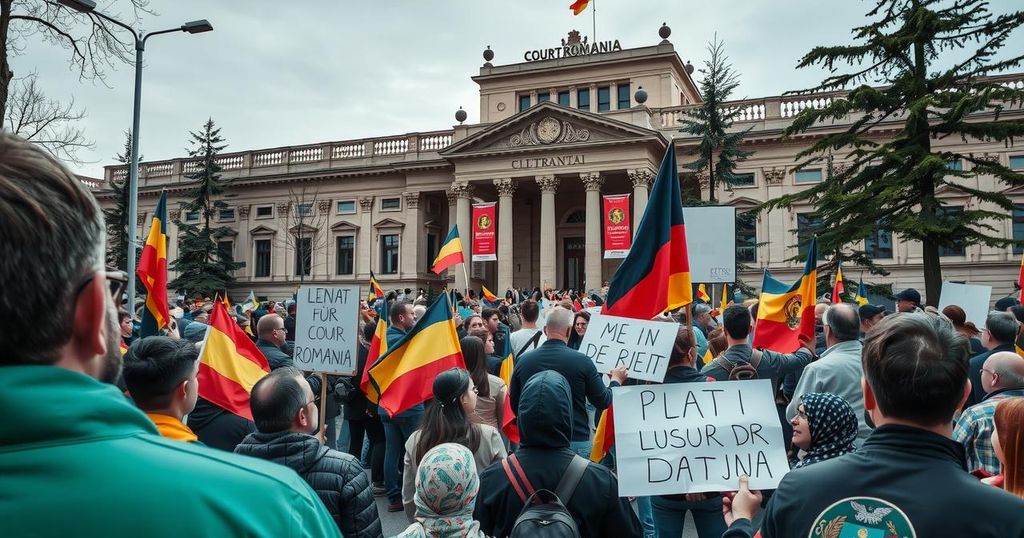Thousands Rally in Romania Against Presidential Election Cancellation

Thousands protested outside Romania’s top court against the cancellation of a presidential election won by pro-Russian candidate Calin Georgescu, raising concerns over political integrity and foreign influence. The ruling coalition has proposed new election dates for May, following ongoing public distrust in state institutions. President Iohannis will continue in office until a new president is elected.
On Friday, thousands of Romanians gathered outside the country’s Constitutional Court in Bucharest to express their dissent regarding the cancellation of the presidential election originally scheduled for December. This decision followed revelations that Calin Georgescu, the initial frontrunner, had benefited from a skewed social media campaign allegedly linked to Russian interference. Protests have persisted since December 6, marking a growing sentiment of distrust towards state institutions amid rising political polarization within the electorate.
The abrupt election cancellation has exacerbated public skepticism toward government entities, reinforcing support for ultranationalist and far-right parties, which now occupy over a third of the parliamentary seats. The ongoing unrest is further fueled by dissatisfaction with mainstream political parties notorious for infighting and corruption allegations. As a response, Georgescu’s legal representation submitted a request for the reinstatement of the election results, emphasizing the urgency of restoring electoral integrity.
Approximately 4,000 demonstrators, bearing national flags, Christian icons, and portraits of Georgescu, congregated outside the court with a symbolic coffin marked “Democracy.” The rallying cries included demands for the right to vote and the reinstatement of the previously scheduled second round of voting. In light of these events, the ruling coalition has proposed a new timeline for the election, with May 4 and May 18 set for the rerun, following a significant delay since the prior cancellation.
President Klaus Iohannis, whose term concluded on December 21, will continue to serve until a new president is elected. Meanwhile, the eligibility of Georgescu—who has expressed criticism of NATO and adverse views on Romania’s assistance to Ukraine in the context of the Russian invasion—remains uncertain. As Romania plays a pivotal role with its extensive land border with Ukraine, it has facilitated substantial humanitarian aid and military support to Ukraine during the ongoing conflict.
In December 2023, Romania’s Constitutional Court annulled a presidential election amidst allegations of foreign interference and unethical campaigning. The decision led to widespread protests reflecting public discontent and a lack of trust in political institutions. The future electoral landscape appears contentious as the country grapples with internal divisions and the influence of ultranationalist parties, highlighting a critical moment in Romania’s democratic processes.
The protests outside Romania’s Constitutional Court signify a pivotal moment of civic engagement in response to perceived electoral injustices. With the planned rerun of the presidential election, the political dynamics are poised for significant changes, particularly as public scrutiny increases regarding governmental integrity. The outcome of the new elections will likely have lasting impacts on Romania’s political landscape and its role in regional affairs, particularly concerning its relationship with Ukraine and NATO.
Original Source: www.usnews.com








